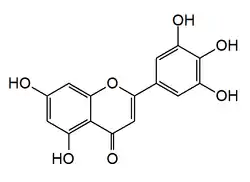Tricetin
Tricetin is a flavone, a type of flavonoid. It is a rare aglycone found in the pollen of members of the Myrtaceae, subfamily Leptospermoideae, such as Eucalyptus globulus.[1] This compound shows anticancer effects on human breast adenocarcinoma MCF-7 cells.[2]
 | |
| Names | |
|---|---|
| IUPAC name
5,7-dihydroxy-2-(3,4,5-trihydroxyphenyl)chromen-4-one | |
| Other names
3′,4′,5,5′,7-Pentahydroxyflavone | |
| Identifiers | |
3D model (JSmol) |
|
| ChemSpider | |
| ECHA InfoCard | 100.237.320 |
PubChem CID |
|
| UNII | |
CompTox Dashboard (EPA) |
|
| |
| |
| Properties | |
| C15H10O7 | |
| Molar mass | 302.23 g/mol |
Except where otherwise noted, data are given for materials in their standard state (at 25 °C [77 °F], 100 kPa). | |
| Infobox references | |
See also
- Tricin synthase produces tricin or Tricetin 3',5'-dimethyl ether
- Tricetin 3',4',5'-O-trimethyltransferase
References
- The Unique Occurrence of the Flavone Aglycone Tricetin in Myrtaceae Pollen. Maria G. Campos, Rosemary F. Webby and Kenneth R. Markham, Z. Naturforsch, 2002, 57c, pages 944-946 (article)
- Tricetin, a Dietary Flavonoid, Inhibits Proliferation of Human Breast Adenocarcinoma MCF-7 Cells by Blocking Cell Cycle Progression and Inducing Apoptosis. Ya-Ling Hsu, Yih-Huei Uen, Yi Chen, Hsin-Lin Liang and Po-Lin Kuo, J. Agric. Food Chem., 2009, volume 57, issue 18, pages 8688–8695, doi:10.1021/jf901053x
This article is issued from Wikipedia. The text is licensed under Creative Commons - Attribution - Sharealike. Additional terms may apply for the media files.